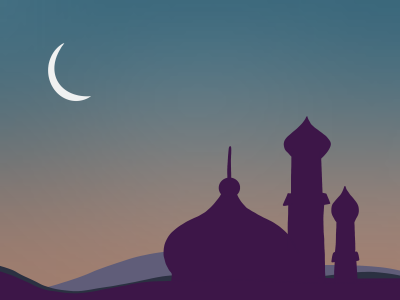The holiest month of the Muslim calendar, Ramadan, starts on Thursday, March 23. It is a month devoted to fasting without food or water from dawn to dusk. Muslims celebrate to honor the revealing of the Quran to the Prophet. Ramadan cultivates a gratifying spiritual and physical awakening that everyone, not just Muslims, can experience.

Ramadan may seem exceedingly demanding, but the experience extends beyond the bodily feeling of hunger and thirst. It exercises the power of the mind and strengthens spirituality. In the book “Secrets of Divine Love” by A. Helwa, the author approaches fasting with three spiritual stages — the outer fast, the inner fast and the heart-centered fast. Islam aims to align the mind, body and soul with God.
“The month-long fast during Ramadan is not meant to be a hardship but to foster gratitude and thankfulness in the believer’s heart,” said Helwa.
The outer fast
The outer fast is restraining from eating, drinking, engaging in sexual intimacy (for married couples) or smoking — focusing on the physical aspect of fasting. The body feels weaker, weakening the ego and revealing personal constraints. A lack of ego will lead to a stronger spiritual connection because you physically remove life’s distractions. This reestablishes your self-control rather than life controlling you.
Abstaining from tangible desires strips pride. When dusk breaks the day’s fast, the discipline of controlling our desires is expected to carry throughout the night by refraining from gluttony and overindulgence.
The inner fast
The inner fast hones in on spiritual acts and the nurturing of Islamic principles. “Just as we empty our stomachs of food, we are also called to empty all of our senses from everything that does not bring us closer to Allah,” says Helwa.
Internal fasting encourages the individual to practice the teachings of Islam, bringing them closer to God. This means avoiding ill-intentioned acts like gossiping, going to unholy places and lying. The inner fast raises awareness of the intentions and repercussions of our actions — letting down our ego to align with ourselves in good nature.
Engaging in the inner fast reconnects a person with a higher power. Helwa says, “When we create space between our thoughts and who we actually are, we realize that we are not our thoughts.” The act of fasting is an opportunity for a spiritual awakening.
The heart-centered fast
The heart-centered fast is never-ending and does not stop at sunset. At this spiritual stage, a deeper connection with God is created and nurtures a connection with one’s self. God’s greatness is remembered with every breath inhaled.
A person becomes “so empty of the self that we become a pure mirror for God on Earth.” The immediate response to the body’s lack of food or water opens our hearts to becoming more generous and considerate to those in need. The hunger and thirst experienced in this month are a fraction of the struggle millions of people feel throughout their daily lives.
This eye-opening experience grounds the heart to appreciate and acknowledge the blessings of life, no matter how big or small.
For anyone fasting Ramadan for the first time, as a Muslim or non-Muslim, or if you have been fasting your whole life, remember that it is beyond no food or water. The hardest part of Ramadan is the week after. You must ask yourself if you will continue liberating yourself from your vices.






















































































































Deemah • Mar 24, 2023 at 3:17 am
“The hardest part of Ramadan is the week after,” I’ve never thought about it this way. Beautifully written and extremely eye opening. Amazing job once again Hano